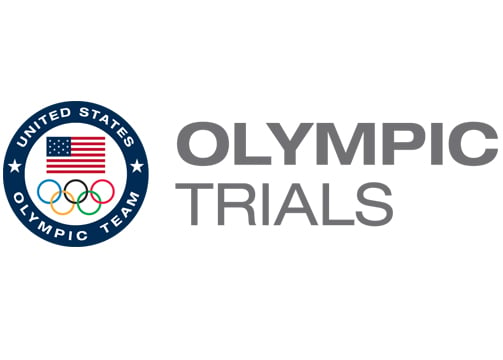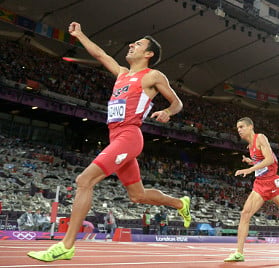73 Americans Pick Up Olympic Standards As IAAF Eases Standards In 17 Events; Should USATF Change The Marathon Trials Standard Accordingly?
Olympic Silver Medalist Leo Manzano Now Has The Standard In The 1,500; 25 U.S. Marathoners Now Have The Olympic Standard But Won’t Be At The Trials Unless USATF Changes The Standard
by LetsRun.com
December 10, 2015
Today the IAAF has announced that at the IAAF Council Meeting on November 26, they tweaked the entry standards for the Rio 2016 Olympic Games, making it easier to qualify in 17 events. They have notified the International Olympic Committee and the new standards are now official. The IAAF explained its decision as follows:
In April 2015, the IAAF Council approved the entry standards but allowed for a review following the IAAF World Championships Beijing 2015 where a similar system of qualification and similar standards were used.
Resulting from the experience of these championships, the Technical Delegates proposed some amendments to the Rio 2016 Olympic Games entry standards, which have been accepted by all parties.
The aim is to have more athletes achieving the standard and therefore, to get closer to the target number of participants.
The new standards are listed below. We’ve put the new standards in the events that have been changed in red. The qualification period began on January 1, 2015 for the 10,000, marathon, race walk and combined events. For all other events, the qualification period began on May 1, 2015.
| 2016 Rio Qualifying Standards | ||
| Event | Women | Men |
| 100 | 11.32 | 10.16 |
| 200 | 23.20 | 20.50 |
| 400 | 52.00 to 52.20 | 45.40 |
| 800 | 2:01 to 2:01.50 | 1:45.80 to 1:46.00 |
| 1500 | 4:06:00 to 4:07.00 | 3:36.00 to 3:36.20 |
| Steeple | 9:45.00 | 8:28.00 to 8:30.00 |
| 5000 | 15:20.00 to 15:24.00 | 13:25.00 |
| 10,000 | 32:15:00 | 28:00.0 |
| Marathon | 2:42:00 to 2:45:00 | 2:17:00 to 2:19:00 |
| 100h | 13 | 13.47 |
| 400h | 56.20 | 49.40 |
| HJ | 1.94 to 1.93 | 2.29 |
| PV | 4.50 | 5.70 |
| LJ | 6.70 | 8.15 |
| TJ | 14.20 to 14.15 | 16.90 to 16.85 |
| SP | 17.80 to 17.75 | 20.50 |
| Discus | 61.00 | 66.00 to 65.00 |
| Hammer | 71.00 | 78.00 to 77.00 |
| Javelin | 62.00 | 83.00 |
| Multi | 6,200 | 8,100 |
| 20k RW | 1:35:00 to 1:36.00 | 1:24.00 |
| 50k RW | NA | 4:03:00 to 4:06.00 |
The new standards mean quite a few US athletes – 73 in all – now have the Olympic standard including 2012 Olympic silver medallist Leo Manzano (full list below). Now the 73 figure is a bit misleading as 59 of the new additions come in the marathon, where athletes in the 2:42:00 to 2:45:00 range for the women and 2:17:00 to 2:19:00 range for men would obviously have to run much faster to dream of making it onto the US team.
In the men’s and women’s marathon, the US Trials standards (2:18:00 and 2:43:00) are now more stringent than the Olympic standard (2:19:00 and 2:45:00). It will be interesting to see if there is now a push to lower the US Trials standard to at least 2:19:00 and 2:45:00. We’ve long felt that the 2:18:00 standard didn’t accomplish anything and that it should be the more round 2:20:00. 2:45 certainly ‘sounds better’ than 2:43 as well. We urge USATF to consider relaxing the standards to let any marathoner with the Olympic standard into the Trials.
Update at 3:52 pm ET. It has been pointed out on the messageboard that USATF may be forced to update the standards. Here is what USATF’s own website said in 2012:
Due to recent arbitration, USATF may have no “Automatic” standard that is superior to the Olympic “A” standard. Thus, “Automatic” standards were adjusted in the 100m, 200m, 400m, 110mH and 400mH. The number of rounds have also changed from 4 to 3 in the 100m, 200m and 110mH to coincide with the Olympic Games program, where those who achieve the “A” standard will advance directly to the quarter-final round.
We wrote USATF asking if they’ll be adjusting the standards like they did in 2012 and they replied via email with the following statement, “As you know, the Olympic standards were just changed. We are looking into whether USATF Olympic Trials standards will need to be adjusted.”
LetsRun.com will update this story if we hear anything else.
The following US men now have the Olympic marathon standard but won’t be on the starting line at the Trials unless something changes – Stephan Shay (2:18:08), Jonathan Mott (2:18:12), Zach Ripley (2:18:26), Mason Frank (2:18:34), Brandon Mull (2:18:14), and Bennett Grimes (2:18:47).
The following US women now have the Olympic marathon standard but won’t be on the starting line at the Trials unless something changes – Sabina Piras (2:43:23), Melissa Burkart (2:43:40), Alexandra Cadicamo (2:43:40), Sara Polatas (2:43:41), Kristen Carter Schafer (2:43:42), Amy Haney (2:44:02), Heather McWhirter (2:44:14), Nora Colligan (2:44:22), Lauren Kersjes (2:44:28), Kaitlin Sheedy (2:44:30), Sara Howe (2:44:39), Alexandra Bernardi (2:44:39), Emily Harrison (2:44:40), Margaret Diacont (2:44:40), Shawna McClain (2:44:42), Becki Michael (2:44:44) and Linnabah Snyder (2:45:00).
US Athletes Who Now Have The Olympics Standard Thanks To The Changes:
Men:
800: Mark Wieczorek (1:45.89), Robby Andrews (1:45.98)
1500: Leo Manzano (3:36.16)
Triple Jump: Alphonso Jordan (16.89)
Men’s Marathon: 22 total. The six listed above plus Scott Wietecha (2:17:02), Eric Ashe (2:17:06), Daniel Tapia (2:17:14), Tony Migliozzi (2:17:27), Max King (2:17:32), Ryan Cosens (2:17:55), Matt Pelletier (2:17:58), Nick Arciniaga (2:18:02), Mike Eaton (2:18:02), Jesse Davis (2:18:02), Chris Lemon (2:18:06), John Raneri (2:18:07), Joe Moore (2:18:22), Tyler McCandless (2:18:29), Scott MacPherson (2:18:34), and Brandon York (2:18:52).
Women:
400: Raena Rhone (52.05), Elexis Guster (52.19)
800: Alexa Efraimson (2:01.11), Hanna Green (2:01.17), Katie Mackey (2:01.20), Gabe Grunewald (2:01.23)
1500: Rachel Schneider (4:06.90)
Marathon: Too many to list but the 17 women above and 20 others.
TJ: Keturah Orji (14.15)
Shot: Dani Winters (17.75)
20k RW: Miranda Melville (1:35.19). Melville already had an Olympic qualifying time of 1:34:46 from the Pan American Cup Trials in April 2015.
Discuss this topic on our forum: MB: 25 Americans now have the Olympic standard in marathon but won’t be at the Trials. Should USATF let them in?
Editor’s note: We deleted the following sentence from the original story: “The US Trials standard is often faster than the Olympic one for sprint events but there are no lane constraints in the marathon.”









